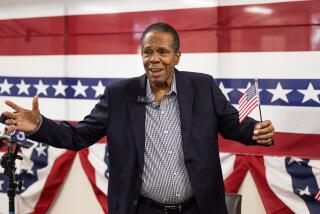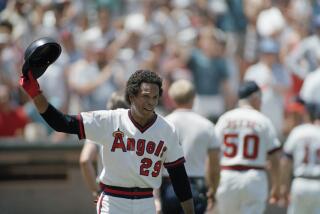Michelle Carew Loses Battle With Leukemia
- Share via
ORANGE — Michelle Carew, the daughter of baseball Hall of Famer Rod Carew who waged a seven-month battle with leukemia that sparked an international outpouring of support and a surge in the pool of potential bone marrow donors, died Wednesday morning. She was 18.
Michelle died at Children’s Hospital of Orange County, with her father, her mother, Marilynn, and a cluster of friends, relatives and nurses at her bedside.
In an emotional news conference at the hospital, Rod Carew brushed away tears as he recounted his family’s parting moments with Michelle, who had become a national symbol for people afflicted with the blood disease.
“We told her we loved her, we’re all here, and to have a safe journey,” Carew said.
Acknowledging the support of well-wishers, Carew said his daughter’s death was not in vain.
“Although we have lost Michelle, we can take solace in the fact that, because of [her], many lives have already been saved by the increase in marrow transplants performed in the weeks subsequent to our appeal.”
The usually taciturn Carew had pleaded for people across the country to sign up as potential donors after he saw how few African Americans and other minorities were registered in the National Marrow Donor Program.
Within a few weeks after he began a public awareness campaign Nov. 6, more than 70,000 calls to the marrow program were generated, many of them from ethnic minorities heeding Carew’s plea. The donor registry’s rolls recently increased to 2 million--up from 1.5 million last year--thanks in large part to the Carews’ efforts to raise awareness.
“That was absolutely awesome,” said Dr. Craig Howe, chief executive officer of the Minneapolis-based national donor program, referring to the family’s action. “It’s the major initiative we have at the present time--to increase the racial diversity of the registry.”
Dr. Richard Stiehm, chief of pediatric immunology at UCLA Children’s Hospital, said Wednesday: “Hopefully, out of the tragedy of Michelle’s dying, people will realize the importance of going out and getting [their marrow] typed.”
But because of Michelle’s rare genetic composition--her father is black with West Indian and Panamanian heritage and her mother is white of Russian-Jewish ancestry--it was difficult to find a suitable donor.
“Being a mixed child, the percentages weren’t in her favor,” Carew said at the news conference. “She just ran out of time, just lost the battle.”
Throughout the day, the family received condolences from the baseball world.
“This is a tragedy for all of us within the organization. Today, a member of the Angels’ family passed away,” said Angel President Richard M. Brown.
“Words are hard to come by,” Angel owner Gene Autry said in a written statement. “Michelle was a fighter throughout her entire illness. She displayed an immense amount of courage. . . . “
A moment of silence was observed Wednesday night at Anaheim Stadium before the start of a game between the Angels and Toronto Blue Jays. And over Carew’s retired No. 29, which hangs just beyond the right-field fence, stadium workers had placed a banner that read: “Pisher 1977-1996.” “Pisher” was Michelle’s nickname.
Last month, Michelle underwent a rare umbilical cord-blood transplant, a new therapy for the treatment of leukemia and other cancers that doctors hoped would eventually reinvigorate her immune system. The procedure involved transplanting cells from a newborn’s umbilical cord into Michelle to stimulate production of normal blood cells.
Before the procedure, which has about a 50% success rate, Michelle received heavy doses of chemotherapy, which kill cancer cells but weaken the immune system, leaving her susceptible to infections and other complications.
Though Michelle was in remission for about three months last winter and strong enough to come home from the hospital for about four hours a day, she took a dramatic turn for the worse in early April--after the cord-blood transplant. Michelle suffered kidney failure and was placed on dialysis.
Dr. Mitchell Cairo, Michelle’s doctor and director of Children’s Hospital of Orange County’s blood and bone marrow transplantation program, said Wednesday the teenager died from cardiac and respiratory failure--complications linked to leukemia therapy.
Cairo said chemotherapy had sapped Michelle’s strength, and had robbed her of the opportunity to enjoy “the fruits” of the cord-blood transplant.
Because she had battled back from health setbacks several times before, Michelle’s death came as a shock to nurses and other hospital officials.
Some hospital personnel sobbed and exchanged hugs during the news conference. “She was the comeback kid,” said Larissa Murphy, the hospital’s transplant coordinator. “We never thought that this would happen. This is very hard.”
Michele Millerick, coordinator of the hospital’s bone marrow program, said Michelle inspired other patients and hospital staff.
“She would always encourage us to go ahead with the publicity for more bone marrow donors,” Millerick said. “But she wanted it for other patients, not just herself. Everyone talked about her selflessness.”
At Canyon High School in Anaheim Hills, from which Michelle graduated last year, some students broke down in tears after Student Council President David Anderson announced the news over the school’s closed-circuit TV system.
Kristie Hiatt, who played with Michelle on the Canyon High Comanches softball team, said: “Even with all of her [health problems], she never gave up. She always came up to bat with a smile on her face. She always picked everyone up.”
Lance Eddy, Michelle’s softball coach and math teacher, said Michelle’s allergic reaction to grass and dust limited her to being a designated hitter for the team. “She used to hit some monster shots,” Eddy said. “She had the Carew hitting eye--she was a hitter.”
Rod Carew, whose family has spent the last seven months in a motor home parked behind the hospital, thanked Cairo, nurses and other hospital staff for their support.
“I don’t know how they do it,” Carew remarked about the hospital staff. “You talk about heroes? There are a lot of heroes up there. They cared for her just like they cared for any other child on that floor.”
Carew also thanked the media--more than two dozen journalists attended the news conference--for publicizing the family’s plea for more potential bone marrow donors.
“You’ve put some light on this,” Carew said. “Hopefully, we’ve saved some lives.”
Michelle’s acute non-lymphocytic leukemia, one of the most aggressive and deadly strains of the disease, was diagnosed last September.
She was writing a paper for a Cypress College freshman English class on Sept. 10 when her mother found her slumped over her computer, complaining of a headache, back pain and blurred vision.
Within days of the subsequent diagnosis, Michelle began an extensive chemotherapy program, as doctors searched for a donor who could provide life-giving bone marrow.
In a bitter irony, Carew’s other two daughters, Charryse, 22, and Stephanie, 20, were a perfect match for each other, but not Michelle.
Carew appeared on several national television programs and granted in-depth interviews to many newspapers. He even stopped strangers on the street, handing them business cards with the phone number for the marrow program, and he wrote to Abigail Van Buren, who printed Carew’s plea in her widely syndicated Dear Abby column.
The response was overwhelming. Letters poured in from all over the world. People sent good-luck charms and well wishes.
Numerous bone marrow donor drives were organized in Southern California. There were calls from as far as France, with tips on possible donor candidates. An inmate serving his 20th year in federal prison wrote the Carews, offering to be tested.
“She became more famous than her dad,” Carew said Wednesday, managing a smile.
A memorial service for Michelle will be 11 a.m. Friday at Temple Beth Shalom in Santa Ana. Burial services will be Sunday in Minneapolis, Marilynn Carew’s hometown.
In lieu of flowers, the family has asked that any contributions be sent to the Pediatric Cancer Research Foundation, c/o Children’s Hospital of Orange County, P.O. Box 1076, Orange, CA 92668-0076.
The National Marrow Donation Program can be reached at (800) MARROW-2.
Times staff writer Renee Tawa and correspondent Alan Eyerly contributed to this report.
* LIVING LEGACY: Family’s plea has added badly needed minorities to potential donor list. A10
* PUBLIC FIGURE: Intensely private Rod Carew went very public in fight to save daughter. C1
* ANGEL REACTION: Players express sympathies and stadium observes a moment of silence. C1
(BEGIN TEXT OF INFOBOX / INFOGRAPHIC)
Michelle Carew’s Struggle
* Sept. 10, 1995: Michelle Carew, daughter of Angel coach Rod Carew, is found by her mother slumped over her computer. She complains of blurred vision, back pain and a headache.
* Sept. 11: A family physician performs blood tests and calls an infectious disease specialist. Michelle enters Placentia Linda Community Hospital.
* Sept. 18: Further blood tests confirm Michelle has acute non-lymphocytic leukemia, one of the most aggressive strains of leukemia. Initial treatment at Children’s Hospital of Orange County in Orange consists of blood and platelet transfusions, followed by heavy chemotherapy, destroying defective bone marrow but also wiping out her immune system and increasing susceptibility to infections.
* Nov. 6: Rod Carew makes emotional appeal during a news conference at Children’s Hospital for volunteers to register with the National Marrow Donor Program in Minneapolis. Michelle’s genetic background--daughter of a black with West Indian/Panamanian roots and a white Russian-Jew--makes it extremely difficult to find a match.
* Nov. 14: On final day of fourth chemotherapy cycle, Michelle is hit for the second time with septic shock, in which toxic waste from bacteria killed by antibiotics attacks the body. By 10 p.m., she is stabilized, but doctors tell the Carews they have done all they can.
* Late December: Michelle goes into remission, emerging from a five-week period in which she was critically ill and in need of round-the-clock care.
* Jan. 26, 1996: More than 62,000 calls to National Marrow Donor Program have been generated by publicity about Michelle. Donor registry increases 33%--to 2 million--due largely to Carews’ efforts.
* Feb. 9: Michelle feels well enough to come home about four hours a day. She has received letters from all over the world. People have sent good-luck charms and stuffed animals by the dozens.
* March 20: Donor with a good genetic match is found. Michelle’s doctor decides she should undergo a rare treatment in which she receives cells from a newborn’s umbilical cord to stimulate production of normal blood cells.
* March 22: Michelle undergoes 45-minute umbilical cord-blood transplant procedure.
* April 1: Michelle suffers kidney failure and begins kidney dialysis; breathing through a respirator, her condition is critical.
* April 5: Rod Carew takes an indefinite leave of absence from the Angels to be with his daughter.
* April 17: Michelle dies at Children’s Hospital of Orange County.
Source: Times reports
Researched by MARTIN HENDERSON / Los Angeles Times
More to Read
Sign up for Essential California
The most important California stories and recommendations in your inbox every morning.
You may occasionally receive promotional content from the Los Angeles Times.











